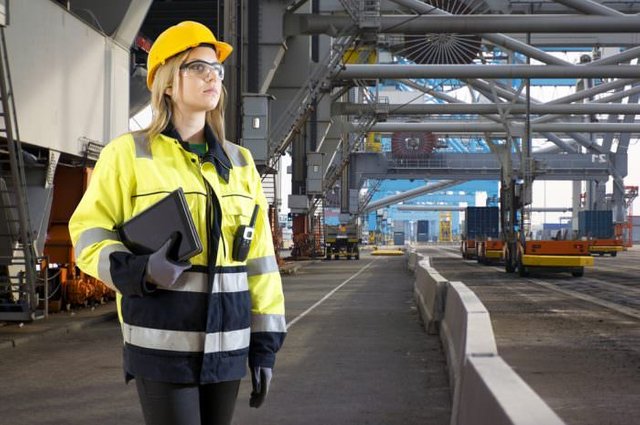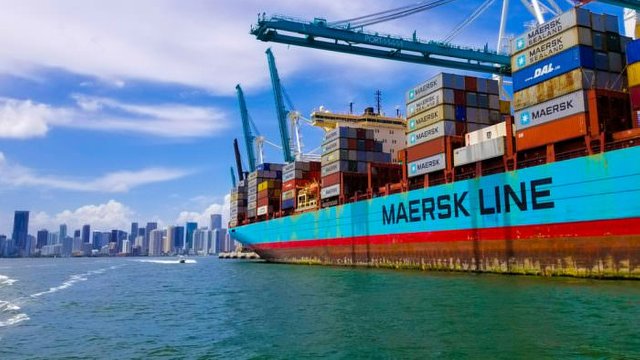How blockchain could make customs checks obsolete
Smart technology has been touted as a solution to Brexit’s potential import/export issues – but it’s not just the UK where blockchain could make customs checks redundant. The implications for global trade are immense.

Blockchain could make customs checks a thing of the past Photo: Shutterstock
Blockchain is already being used by Middle East shipping hub Abu Dhabi to keep track of freight movements, while IBM and shipping giant Maersk have set up a joint venture that will use the technology to transform shipping logistics.
The adoption of blockchain in the shipping and air-freight industry will enable real-time tracking of cargo and documents, saving time and making for frictionless shipments between countries.
Big companies already avoid customs checks in many parts of the world through ‘trusted trader’ schemes, with movements tracked through logistics software.
Digital signatures
But blockchain will take cross-border movements to a whole new level of sophistication, with every package on every container or truck having a digital signature, using blockchain, that will allow customs officials to know every last detail – the country of origin, the manufacturer, the contents, the shipper, the end-customer, and whether customs dues are liable and/or have been paid.
According to the World Economic Forum (WEF), potential savings could be as high as 20% of the total physical transportation costs.
The WEF says distributed ledger technology allows for real-time, multi-party tracking, digital ‘bills of lading’ and letters of credit, machine-to-machine interactions, and better visibility of assets and liabilities.
The organisation believes smart contracts – simple, automated apps running on the blockchain – digital wallets and secure information transfer could transform operations, unlocking new opportunities and cutting bureaucracy and paperwork.
Monitoring consignments
Up to 100 different organisations could be involved in shipping a container, from customs to freight companies to individual truck drivers – so blockchain offers the perfect solution, allowing everyone to be aware of a consignment’s status at any point in time.

Paperwork on shipping consignments can be complex – making it ideally suited to blockchain solutions Photo: Shutterstock
“The port, harbour and terminal business sits at the crossroads of the majority of global trade routes, making the sector one of the key enablers of the global supply chain; however, I believe it can also sit at the crossroads of blockchain,” says Wolfgang Lehmacher, head of supply chain and transport industries at the WEF.
He believes blockchain can create a seamless process, while ensuring the “integrity and authenticity of information as the basis of trust among all parties involved”.
Shipping giant Maersk was early to the party with blockchain, taking part in a proof-of-concept exercise with the IT University of Copenhagen to digitise the bill of lading.
Avoiding checks
Dr Roman Beck, a professor at IT University of Copenhagen, told International Business Times: “For historic reasons the shipment company takes charge of providing the information to all these stakeholders, ensuring quality control and that nothing has been fiddled with. For me it’s the perfect kind of application area for a nice blockchain solution.”
While the ability to avoid time-consuming customs checks is, perhaps, the most obvious advantage – with implications for a smooth and seamless UK/EU border after Brexit – there is also the potential for huge cost savings. Dr Beck gave the example of a shipment of roses from Kenya to Rotterdam, which could generate a pile of paper 25cm high.
But while blockchain is designed to be transparent, it can also protect privacy when required.
“Say, for example, I am selling you computers, and I bought them from some other producer in China. I don’t want you to know my originator, who is actually the real producer, because then you can go straight to this person.
“We have put this into a demonstration to illustrate how this can be achieved.”
Teaming up with IBM
Following Maersk’s earlier studies, the company this year announced a collaboration with IBM called TradeLens, which will apply blockchain to the global supply chain.
More than 20 port and terminal operators around the world are already actively involved in the programme, including Hong Kong, Singapore and Rotterdam, with customs authorities in the Netherlands, Saudi Arabia, Australia and Peru also signing up.
TradeLens uses IBM blockchain technology to establish a single shared view of a transaction without compromising details, privacy or confidentiality. Shippers, freight companies, port operators and customs authorities can access real-time shipping data and documents, while smart contracts allow for digital collaboration.
During a 12-month trial, Maersk and IBM worked with dozens of partners to identify time-saving opportunities. In one example, TradeLens cut the transit time of a shipment of packaging materials to a US production line by 40%, saving thousands of dollars.
Logging millions of shipping events
Some supply-chain companies believe TradeLens could cut the number of steps taken to answer basic operational issues such as “where is my container” from 10 steps to one, and from five people to one person.
More than 154 million shipping events have already been captured on the platform, and the data is growing at a rate of close to one million events per day. They include information such as arrival times of vessels and container ‘gate-in’, and documents such as customs releases, commercial invoices and bills of lading.
“We believe blockchain can play an important role in digitising global shipping, an area of the global economy that moves $4trn dollars of goods every year,” said Bridget van Kralingen, senior vice-president of IBM global industries, solutions and blockchain.
“However, success with the technology rests on a single factor – bringing the entire ecosystem together around a common approach that benefits all participants equally.
“Our work with Maersk and other enterprises in the shipping ecosystem has shown blockchain can be used to form a strong, connected network in which all members gain by sharing important data and that together we can transform a vital part of how global trade is conducted.”
Smoothing the way for Brexit
With the UK’s departure from the EU due in March 2020, one way blockchain could smooth the customs process is by digitising certificates of origin, which confirm where products (or their components) were made.
James Monk, director of UK chamber of commerce Business West, told the Financial Times that his organisation issued 30,000 to 40,000 certificates of origin every year – a figure that could rise dramatically after Brexit.
He said the documents, together with a lot of other essential paperwork for exporting goods, could be shared via blockchain. “A standardised process could simplify and make it easier to check many parts of the supply chain including customs declarations, bills of lading and letters of credit,” he told the FT.
However, a spokesman for HM Customs said while the use of blockchain was being explored through proofs of concepts, focusing on solving specific business problems, there was no plan “to rush into any large-scale adoptions”.
He added: “We’re exploring how blockchain technology might improve how we operate across all aspects of our business, but have no current plans for deployment.”
Meanwhile in the Middle East, Maqta Gateway, an Abu Dhabi Ports subsidiary, is already running its own blockchain logistics technology called Silsal.
According to Captain Mohamed Juma Al Shamisi, CEO of Abu Dhabi Ports, Silsal combines blockchain with unique digital-user identities to provide a seamless and secure link between stakeholders.
Captain Mohamed Juma Al Shamisi, CEO of Abu Dhabi Ports, said: “Not only have we introduced our own blockchain offering, but we have also invented our own form of digital identity. This will eliminate the need for access through passwords, which can often be a security risk.”
Blockchain is undoubtedly a technology who time has come, and nowhere is it set to have a bigger impact than with logistics and customs.
Story by Richard Reed
Source https://dex.openledger.io/how-blockchain-could-make-customs-checks-obsolete/
Follow OpenLedger!